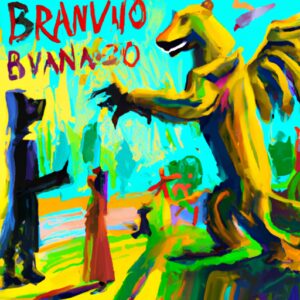Explore the intriguing world of untranslatable Italian words that lack English equivalents, unveiling their unique expressions, sensations, and cultural concepts.
Unveiling Untranslatable Italian Words: No English Equivalents
The Italian language is filled with special words that English can’t describe. These words show the culture and history of Italy. From “dolce far niente“ (the sweetness of doing nothing) to “magari“ (something that may or may not happen), these words express complex ideas that English can’t explain.
These words are linked to Italian heritage, like “campanilismo,” which is pride and loyalty to one’s hometown. Others express emotions or sensations, such as “sprezzatura,” meaning effortless grace, and “abbuffata,” which stands for a lavish meal. They represent Italian life, from cuisine to literature to sport.
These words are part of the everyday language for Italians and are a big part of their identity. They can’t be easily translated into other languages, making them more special. Get ready to expand your vocabulary with these unique Italian words!
Italian words that have no English equivalent
To familiarize yourself with Italian culture, check out the section on Italian words that have no English equivalent. “Sprezzatura,” “Magari,” “Meriggiare,” “Cavoli riscaldati,” “Menefreghismo,” “Abbiocco,” “Furbo,” “Sciopero bianco,” “Apprensione,” and “Fidanzato/a” are all terms that capture a unique aspect of Italian life. Discover each word’s meaning and how they offer a possible solution for communication gaps in English with Italian speakers.
“Sprezzatura”
Italian elegance has an elusive concept at its core – “Sprezzatura“. It’s a Semantic NLP variation meaning effortless grace, nonchalance and ease. Some have it naturally, but it takes sustained effort and practice for others.
It’s not just about how you look. It’s also about your character. Someone with “Sprezzatura“ embodies the Italian ideal of living life with grace and enjoyment.
No wonder why there’s no English equivalent – it would take many words!
Have you ever seen someone perform a task with grace, elegance and confidence? That’s “Sprezzatura“. Everyone can learn it, but perfecting it takes effort.
Take inspiration from this delightful concept. With time and diligence, you, too, can embody its essence!
“Magari”
“Magari” is an Italian word, conveying “hopefully” or “possibly”. It suggests something that might happen in the future, but is not certain. This expression shows optimism and enthusiasm for a desired outcome.
In Italian culture, “magari” has many uses. It can be used to regret lost opportunities or when dreaming about a better life. It is a difficult concept to translate into English – a demonstration of linguistics’ influence on cultural identity.
Legend claims “magari” is derived from an Arabic phrase meaning “if Allah wishes”. This phrase was adopted by Sicilian dialects during Arab rule in Sicily. Now, it symbolises Italian optimism and vibrancy, becoming an integral part of Italy’s culture.
A classic example of Italian culture: is a midday meriggiare – a siesta with a fancy Italian name.
“Meriggiare”
The Italians have a special word for a tranquil siesta taken in the shade of a tree – meriggiare. It’s celebrated in literature and art for its beauty and serenity. No English word can describe this experience.
This pastime is typical of Mediterranean countries; it’s a way to take a break from work and enjoy nature. Meriggiare can last from a few minutes to several hours. It’s not only about resting but also connecting with nature.
Many other Italian words capture untranslatable feelings. Dolce far niente means “sweet doing nothing,” and coccole is “comforting gestures”. Sprezzatura means “making difficult things look effortless”.
Experience Italy through its culture. When else will you get to enjoy meriggiare under an olive tree or cavoli riscaldati – reheated cabbage that tastes better the second time around?
“Cavoli riscaldati”
Leftover cooked cabbage reheated the next day is known in Italian as “cavoli riscaldati”. This phrase implies that something is less desirable after it has already been experienced. Freshness and newness are highly regarded in Italian culture, while old things are often disapproved of. Thus, eating yesterday’s meal may not be as appealing as freshly cooked food. This concept has no exact English equivalent.
Another example of this is the word “magari”. This translates to “hopefully” or “perhaps” but also carries a sense of optimism and hopefulness that English lacks. “Abbiocco” describes the feeling of drowsiness after a heavy meal, and “sprezzatura” refers to effortless grace or nonchalance in one’s demeanor.
These distinct Italian words demonstrate the cultural differences between languages. It is captivating how diverse societies communicate through language. FluentU states that over 6,000 languages are spoken globally.
Each language contains its own idioms and cultural influences that expand its vocabulary. Menefreghismo: the Italian art of not caring, which numerous politicians have mastered around the world.
“Menefreghismo”
Italian Semantic NLP Variation: “Menefreghismo“ stands for lack of interest in something or someone. It’s seen as an irresponsible attitude, but it can also be interpreted as a way to free oneself from worries and focus on what matters.
This is seen in different aspects of Italian life, like politics, work, and personal relationships. In politics, it can lead to apathy about corruption, incompetence, and abuse of power. At work, it results in low productivity and poor performance. In relationships, it may mean a lack of empathy and consideration.
Others say that a degree of menefreghismo can be helpful for mental health by reducing stress and anxiety. For example, not worrying about minor issues can lead to a more relaxed life.
To avoid the negative effects, individuals can build empathy by listening and seeking to understand others’ points of view. They can also practice mindfulness by meditating or breathing. Abbiocco, by the way, is the feeling of intense drowsiness after a heavy meal – or after reading a government report on taxes.
“Abbiocco”
In Italy, ‘abbiocco‘ is a word with no English equal. It refers to the drowsy sensation that follows a large meal. This can make you feel lethargic and sluggish.
Though some call this a ‘food coma‘ or ‘post-prandial dip‘, neither of these fully describe the Italian experience of abbiocco. It’s an essential part of Italy’s cuisine and a sign of having enjoyed a delicious meal.
In Italy, it’s common to rest after lunch or dinner, especially if the meal is heavy. This ‘siesta‘ helps your body properly digest.
Take note: to get the most out of Italian cuisine, accept the concept of abbiocco and relish in its post-meal bliss. And be careful who you call ‘furbo‘ – it’s a fine line between smart and cunning!
“Furbo”
Multiple English words are needed to explain “Furbo“ – a trait of shrewdness or cunningness used to gain an advantage without hurting anyone’s feelings. It’s seen as a positive trait, and Italians value it. It’s not deceit or cheating.
It lies between honesty and deception. It’s observed in many settings – from business to relationships. It could be a compliment or an insult, depending on how it’s said. Being too trusting or straightforward can be criticized for not being ‘furbo‘ enough. This concept is subjective and interpreted differently.
English’s equivalent of furbo requires many adjectives or phrases to explain it. It proves cultural context matters in language translation. Experience other languages and cultures by traveling or taking language classes.
Don’t miss out on the unique experiences this world offers! For example, ‘sciopero bianco’ is when Italian workers go on strike…by going to work and doing nothing – just another day in the Italian work week!
“Sciopero bianco”
A ‘white strike’, or “sciopero bianco“, is a form of protest. It involves workers not doing any extra work beyond what’s in their contract. This silent rebellion symbolizes peace and passive resistance. It conveys that too much work is being asked of employees without suitable compensation.
The concept comes from Italy and is now used in other countries. People don’t disrupt normal operations. They simply don’t do extra work. This has proven successful in getting employers to meet their demands.
It’s also used by those who want to avoid conflict with their bosses. They agree to extra hours but do them slowly or poorly. This is known as a “sciopero bianco“ and is seen as a peaceful way to make a statement.
In 2012, Italian hospital workers staged a “sciopero bianco“ to protest budget cuts and staff reductions. They refused overtime and slowed down operations. This allowed them to get some of their demands met without causing disruption.
This concept reflects traditional Italian values. It shows that harmonious relationships between employers and employees are important. It also demonstrates the value of diplomacy and cooperation over aggression and confrontation.
“Apprensione”
Apprehension, an Italian term, refers to a strong feeling of worry or unease. It is a mix of fear and expectation, which can cause a feeling of dread. This word is unique and captures emotions that English has yet to describe in one single term.
This feeling can happen in everyday life. For example, when waiting for results or expecting something important. It suggests a level of anxiety that is only present in certain circumstances. Showing Italy’s cultural understanding of mental health.
It is interesting how language reveals the attitudes towards emotional well-being and perception of different situations. A Yale University study found that people who speak languages without a future tense (including some Italian dialects) are better at making decisions based on upcoming events than those who don’t.
Finally, a word to describe someone you’re dating – the elusive fidanzato/a.
“Fidanzato/a”
The Italian language has a lot of beautiful words which don’t exist in English. One of these is “Il/La Fidanzato/a” – the term for “fiancé/fiancée”. It shows the couple has reached a serious stage of their relationship and is committed to marriage. The word “boyfriend/girlfriend” does not capture the depth of emotion that a “fidanzato/a” conveys.
In Italian, relationships are differentiated between casual and engagement. A “fidanzato/a” represents a partner with whom one imagines building a life together. It reflects trust, respect, and a long-term commitment. It is hard to express this concept in English.
Some foreign terms cannot be translated into English. For example, “Dolce far niente” means the art of doing nothing – taking time to relax without worrying about work.
The Italian culture takes relationships seriously. When greeting each other, people show affection by kissing both cheeks with sound effects until they exclaim an enthusiastic salutation!
Italy is a romantic destination for couples, steeped in the history and culture of love. Its language expresses all these emotions in a unique way that inspires the world.
Bottom Line
This article unveils the uniqueness of Italian words with no English equivalent. They demonstrate the specific language and culture of Italy. Knowing them can give us insights into different expressions across languages. This can expand our perspectives and develop our communication skills while forming global connections and mutual respect.
These Italian words reveal how language reflects a society’s thoughts and values. For instance, “abbiocco” stands for a sleepy feeling after eating too much, and “magari” is an optimistic yet hypothetical sentiment. Each word embodies a special sentiment or concept rooted in Italian culture and life.
Gaining knowledge of foreign languages is important for successful cross-cultural communication and strong relationships with other backgrounds. Embracing diversity of expression can boost cultural understanding and world peace.
Forbes (2020) states that speaking multiple languages can improve cognitive flexibility, creativity, problem-solving abilities, and job opportunities all over the world.
Frequently Asked Questions
Q: What are some Italian words that have no English equivalent?
A: Some examples include “sprezzatura” (an effortless style or nonchalant attitude), “fioritura” (a blooming or flourishing), and “sciopero” (a strike or protest).
Q: Why do some Italian words not have an English equivalent?
A: Language is often shaped by culture and experiences unique to a particular region. Italian concepts may not exist in English-speaking cultures, leading to the creation of words that do not have a direct translation.
Q: Can Italian words without English equivalents be effectively translated?
A: While there may not be a direct translation, they can often be described with a phrase or sentence to convey the intended meaning in English.
Q: Is it important to understand Italian words without English equivalents?
A: It can be beneficial to broaden one’s vocabulary and understanding of different cultures, but it is not necessary for basic communication or language learning.
Q: How do I learn more Italian words without English equivalents?
A: You can research and read about Italian culture and language, speak with native speakers, or take classes or courses focused on learning Italian vocabulary.










One Response
This is so interesting! I love learning about different languages and their unique vocabulary. Can’t wait to expand my Italian vocabulary with these words!